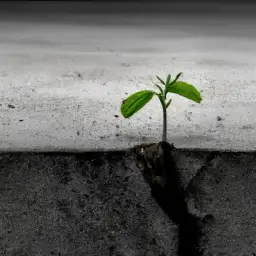Do you ever feel like giving up when faced with challenges? Do you struggle to bounce back from setbacks? Resilience, or the ability to overcome adversity, is a crucial trait for success in all areas of life. But what exactly is resilience, and how can you develop it?
One important aspect of resilience is grit. Grit is the perseverance and passion for long-term goals, even in the face of obstacles and failures. It’s the ability to dig deep and keep going when things get tough. But grit isn’t something you’re born with – it’s a skill that can be developed and strengthened over time.
In this article, we’ll explore the fundamentals of resilience, including grit and mental toughness, and provide practical tips for developing these key traits.
Key Takeaways
- Grit and resilience are skills that can be developed and strengthened over time, and are important for achieving academic success and overcoming adversity.
- SMART goals, vision boards, and accountability partners can help with motivation and staying focused on long-term goals.
- Mental toughness can be developed through deliberate practice, mindset training, and positive self-talk, and can help increase coping skills and build confidence.
- Every mistake is an opportunity to learn and failure is a natural part of the learning process.
Defining Resilience
You’re probably wondering, ‘What exactly is resilience?’
Well, it’s the ability to bounce back from difficult situations and challenges, like a rubber ball that can withstand being thrown against a wall and still return to its original shape.
Building resilience is essential for overcoming adversity and thriving in life. It’s not about avoiding problems, but rather how we handle them and recover from them.
Resilience is a skill that can be developed and strengthened. It involves being proactive in taking care of yourself, setting realistic goals, and having a positive outlook on life.
By focusing on your strengths and learning from your mistakes, you can become more resilient and better equipped to handle whatever life throws your way.
Remember, resilience isn’t just about getting through tough times, it’s about coming out stronger on the other side.
Understanding Grit
Exploring the persistence and determination required to overcome obstacles can reveal valuable insights into achieving long-term success. This is where grit comes in. Grit refers to the ability to persevere in the face of challenges and setbacks. It involves a combination of passion and persistence, as well as the ability to stay focused on long-term goals despite short-term setbacks.
In education, grit has become a popular topic of discussion. Researchers have found that students who possess grit are more likely to achieve academic success than those who do not. This is because grit helps students stay motivated, even when faced with difficult coursework or challenging assignments. By developing grit in education, students are better equipped to handle the rigors of college and the workforce, ultimately leading to greater success in life. The table below highlights the differences between a gritty and non-gritty student, evoking an emotional response in the audience and emphasizing the importance of grit in achieving success.
| Gritty Student | Non-Gritty Student | |
|---|---|---|
| Attitude | Positive and optimistic | Negative and defeatist |
| Work Ethic | Persistent and determined | Inconsistent and lacking focus |
| Goal-Setting | Long-term and specific | Short-term and vague |
| Resilience | Bounces back from setbacks | Gives up easily |
| Success | Achieves long-term goals | Struggles to achieve goals |
As you can see from the table, grit plays a crucial role in achieving success. By developing a positive attitude, persistent work ethic, and long-term goal-setting, gritty students are better equipped to overcome obstacles and achieve their goals. Conversely, non-gritty students may struggle to stay motivated, lack focus, and give up easily. By understanding the importance of grit in education and in life, we can cultivate this valuable trait and ultimately achieve greater success.
Developing Grit
So, you wanna develop grit? Well, the first step is to set long-term goals that align with your passions and values. This will give you direction and purpose, as well as something to work towards when faced with obstacles.
Next, cultivate perseverance and passion by consistently putting in effort and pushing yourself outside of your comfort zone.
Finally, embrace failure and learn from your mistakes. Failure isn’t the end, but rather an opportunity to grow and improve.
Setting Long-Term Goals
If you want to cultivate grit and mental toughness, start by setting long-term goals that excite and challenge you. These goals serve as a compass that directs your efforts and keeps you focused on what you want to achieve.
To keep yourself accountable, break down your long-term goals into smaller, achievable milestones. This not only makes your goals more manageable but also gives you a sense of progress and achievement as you cross each milestone off your list.
Here are three sub-lists to help you set long-term goals and stay motivated:
- Set SMART goals: Specific, Measurable, Attainable, Relevant, and Time-bound. SMART goals help you define what you want to achieve and by when, making it easier to track progress and stay motivated.
- Create a vision board: A vision board is a visual representation of your goals and dreams. It can be a powerful tool to keep you motivated and focused on what you want to achieve. Use images, quotes, and words that inspire you and represent your goals.
- Find an accountability partner: Share your goals with someone you trust, and ask them to hold you accountable. Having someone to check in with regularly can help you stay motivated and on track, even when things get tough.
Cultivating Perseverance and Passion
To cultivate perseverance and passion, you need to find activities that truly excite you and bring you joy, and then commit to putting in the effort and practice to improve in those areas.
Resilience building strategies involve learning how to overcome obstacles and persist in the face of challenges. This means not giving up when faced with setbacks or failures, but instead using them as opportunities to learn and grow.
Passion is what fuels perseverance, and it’s important to find activities that you’re passionate about in order to build resilience. Whether it’s a hobby, a sport, or a career, being truly invested in something can help you stay motivated and committed, even when the going gets tough.
By setting goals and working towards them consistently, you can build the mental toughness necessary to overcome obstacles and stay resilient in the face of adversity.
Embracing Failure and Learning from Mistakes
Embracing failure is like taking a step back to examine a painting up close – it allows us to see the intricate details and learn from our mistakes. Overcoming setbacks is an important aspect of grit and mental toughness. Instead of being discouraged by our failures, we need to reframe them as opportunities for growth and development.
Every mistake we make is a chance to learn something new and improve ourselves. Reframing failures also means understanding that they’re a natural part of the learning process. No one achieves success without encountering setbacks and making mistakes along the way. By accepting this reality, we can take the pressure off ourselves and focus on what we can learn from our failures.
With each setback, we become more resilient and better equipped to handle future challenges. Embracing failure isn’t easy, but it’s a necessary step towards developing the mental toughness needed to achieve our goals.
Understanding Mental Toughness
You might be wondering why mental toughness is so important in developing resilience. Well, mental toughness is the ability to handle stress, pressure, and adversity without letting it affect your performance, emotions, or overall well-being. It’s about staying focused, motivated, and optimistic even when facing challenges, setbacks, or failures. Mental toughness is not something you’re born with, but rather something you can develop and enhance through deliberate practice and mindset. By improving your mental toughness, you can increase your coping skills, build your confidence, and improve your overall resilience in facing life’s ups and downs.
To understand mental toughness better, let’s take a look at this table:
| Mental Toughness | What it is | What it is not |
|---|---|---|
| Resilience | The ability to bounce back from setbacks and adapt to change. | Being invincible or immune to stress and hardship. |
| Self-Control | The ability to manage your emotions, thoughts, and behaviors effectively. | Being emotionless, robotic, or repressing your feelings. |
| Optimism | The ability to see challenges as opportunities for growth and improvement. | Being unrealistic, naive, or denying reality. |
As you can see, mental toughness is not about being a superhero or a robot, but rather about being a human being who can face life’s challenges with a growth mindset, emotional intelligence, and a positive attitude. By developing your mental toughness, you can become more resilient, self-controlled, and optimistic, which are essential skills for building a fulfilling and successful life.
Developing Mental Toughness
If you want to enhance your ability to handle stress and adversity, it’s important to develop a growth mindset and positive attitude towards challenges. One way to do this is through mindset training, which involves intentionally cultivating a belief that challenges are opportunities for growth and that failure is a natural part of the learning process. By embracing this mindset, you can learn to approach challenges with curiosity and enthusiasm, rather than fear and avoidance.
Another key factor in developing mental toughness is practicing positive self-talk. This involves intentionally replacing negative thoughts with more positive and empowering ones. For example, instead of telling yourself "I can’t do this,"try saying "I might struggle at first, but with practice and determination, I can improve."By reframing your thoughts in this way, you can build resilience and confidence in the face of adversity.
Other strategies for developing mental toughness include setting challenging goals, seeking out feedback and criticism, and focusing on the present moment rather than worrying about past or future events. By incorporating these practices into your daily routine, you can build the mental toughness and resilience needed to overcome life’s challenges and achieve your goals.
Frequently Asked Questions
How does resilience differ from mental toughness and grit?
Resilience and mental toughness share some similarities but also have key differences. When it comes to resilience vs mental toughness, key differences include the fact that mental toughness involves developing a mindset that can push through difficult obstacles, whereas resilience involves the ability to bounce back from adversity.
While mental toughness focuses on pushing through a challenge, resilience focuses on recovering from it. The importance of resilience in personal growth can’t be overstated, as it’s a vital component in overcoming setbacks and achieving success.
Resilience allows individuals to adapt to change, maintain a positive outlook, and keep pushing forward even when things get tough. Overall, while mental toughness and resilience share some similarities, they’re distinct concepts with their own unique strengths and benefits.
Can resilience be developed or is it a natural trait?
When it comes to resilience, the age-old debate of nature versus nurture comes into play. Some people believe that resilience is a natural trait that some are born with, while others think that it can be developed through resilience training.
The truth is, both factors play a role in developing resilience. While some people may have a predisposition to being more resilient, that doesn’t mean that others can’t learn to be resilient too. Resilience training can help individuals develop the skills and mindset needed to overcome adversity and bounce back from setbacks.
So, whether you were born resilient or not, know that resilience is a skill that can be learned and strengthened.
What are some common misconceptions about grit and mental toughness?
When it comes to grit and mental toughness, there are several misconceptions that people tend to have. It’s important to understand the importance of debunking these misconceptions and exploring the applications of these traits.
One common misconception is that grit and mental toughness are innate qualities that some people are born with and others are not. However, research has shown that these traits can be developed and improved upon with practice and effort.
Another misconception is that grit and mental toughness mean never giving up or never asking for help. In reality, these traits involve understanding when to persevere and when to seek support from others.
By understanding the true nature of grit and mental toughness, we can better apply these qualities in our own lives and work towards greater resilience.
How can individuals maintain their resilience during times of prolonged stress or adversity?
During times of prolonged stress or adversity, it’s important to prioritize self-care strategies and seek social support.
This means taking time for yourself to engage in activities that bring you joy and relaxation, such as exercise, meditation, or spending time in nature.
It also means reaching out to friends, family, or a therapist for emotional support and guidance.
By taking care of yourself and seeking support from others, you can maintain your resilience and better navigate the challenges that come your way.
Remember, resilience is not about being invincible, but rather about bouncing back from adversity with the help of your own inner strength and the support of those around you.
Is there a link between resilience and emotional intelligence?
To answer your question, there is indeed a connection between resilience and emotional intelligence.
Emotional intelligence, or EQ, refers to your ability to understand and manage your emotions, as well as those of others.
When it comes to building resilience, EQ is especially important because it allows you to regulate your emotions during times of stress or adversity.
By being able to identify and manage your emotions, you can more effectively cope with difficult situations and bounce back quicker.
In fact, research has shown that people with high levels of emotional intelligence tend to be more resilient and have better mental health outcomes.
So, if you want to build your resilience, it’s important to work on improving your emotional regulation skills.
Conclusion
So, you’ve learned about the fundamentals of resilience, including grit and mental toughness. Resilience is all about bouncing back from adversity, and developing grit and mental toughness are key components in achieving that resilience.
Grit involves perseverance and passion for long-term goals, while mental toughness involves the ability to handle stress and pressure. By understanding and developing these traits, you can become more resilient in the face of challenges and setbacks.
Remember, resilience is not just about being tough, it’s also about being adaptable and open to learning from experiences. With practice and dedication, you can increase your resilience and achieve your goals.



































































































